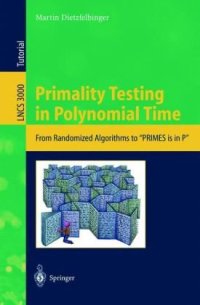
Ebook: Primality Testing in Polynomial Time: From Randomized Algorithms to "PRIMES Is in P"
Author: Martin Dietzfelbinger (auth.)
- Genre: Mathematics // Number Theory
- Tags: Algorithm Analysis and Problem Complexity, Computation by Abstract Devices, Data Encryption, Probability and Statistics in Computer Science, Number Theory, Algorithms
- Series: Lecture Notes in Computer Science 3000
- Year: 2004
- Publisher: Springer-Verlag Berlin Heidelberg
- City: Berlin; New York
- Edition: 1
- Language: English
- pdf
On August 6, 2002,a paper with the title “PRIMES is in P”, by M. Agrawal, N. Kayal, and N. Saxena, appeared on the website of the Indian Institute of Technology at Kanpur, India. In this paper it was shown that the “primality problem”hasa“deterministic algorithm” that runs in “polynomial time”. Finding out whether a given number n is a prime or not is a problem that was formulated in ancient times, and has caught the interest of mathema- ciansagainandagainfor centuries. Onlyinthe 20thcentury,with theadvent of cryptographic systems that actually used large prime numbers, did it turn out to be of practical importance to be able to distinguish prime numbers and composite numbers of signi?cant size. Readily, algorithms were provided that solved the problem very e?ciently and satisfactorily for all practical purposes, and provably enjoyed a time bound polynomial in the number of digits needed to write down the input number n. The only drawback of these algorithms is that they use “randomization” — that means the computer that carries out the algorithm performs random experiments, and there is a slight chance that the outcome might be wrong, or that the running time might not be polynomial. To ?nd an algorithmthat gets by without rand- ness, solves the problem error-free, and has polynomial running time had been an eminent open problem in complexity theory for decades when the paper by Agrawal, Kayal, and Saxena hit the web.
This book treats algorithms for the venerable "primality problem": Given a natural number n, decide whether it is prime or composite. The problem is basic in number theory; efficient algorithms that solve it, i.e., algorithms that run in a number of computational steps which is polynomial in the number of decimal digits needed to write n, are important for theoretical computer science and for applications in algorithmics and cryptology. This book gives a self-contained account of theoretically and practically important efficient algorithms for the primality problem, covering the randomized algorithms by Solovay-Strassen and Miller-Rabin from the late 1970s as well as the recent deterministic algorithm of Agrawal, Kayal, and Saxena.
The volume is written for students of computer science, in particular those with a special interest in cryptology, and students of mathematics, and it may be used as a supplement for courses or for self-study.